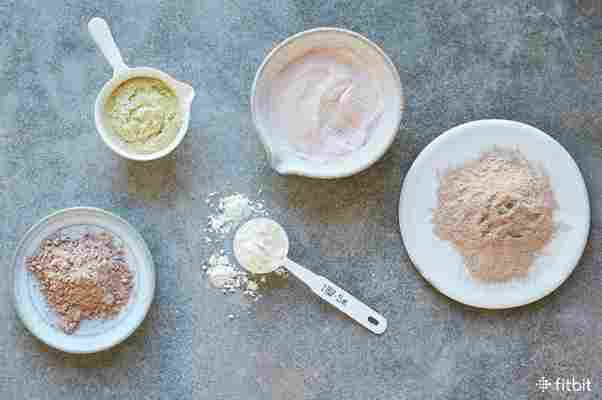Do You Really Need Protein Powder?
Yes, your body absolutely needs protein. Especially if you’re stepping it up with your workouts, you want to make sure you’re getting the right amount throughout the day. But you can get plenty of protein from whole foods, so hold up before you start scooping powders and blending.

What’s Actually in Protein Powder?
Protein powders are processed foods, made from lots of different ingredients. In their simplest form, they come from milk (whey is a by-product) or egg whites. But vegan and plant-based options also exist, derived from soy, hemp, peas, and more. Protein powders can also contain added sugars, artificial sweeteners and flavors, probiotics, vitamins, and minerals—even additives like caffeine or creatine. So some powders are more processed than others, and some are better for you than others.
Do You Really Need Protein Powder?
The short answer: no. You can easily get the protein you need from natural sources, such as eggs, chicken breast, fish, beans, milk, cottage cheese, nuts, seeds, and whole grains. Athletes rely on protein powder because they typically need more protein, plus it’s convenient. In general, athletes need anywhere from 0.54 to 0.91 grams per pound of body weight every day, and carefully time that before and after workouts, to maximize muscle recovery and growth. For instance, if you’re running 25 to 30 miles per week, you might want to chase tough workouts with 20 grams of protein, along with some carbs. That could be 1 cup of plain Greek yogurt with berries and whole-grain cereal, or 2 scrambled eggs with a whole-wheat English muffin and a piece of fruit. But when you’re busy, it’s easy to grab a shake or a bar. Just remember: it’s never a good idea to take supplements you don’t need, and you don’t want to let extra protein turn into excess calories.
Make sense? Still want to use one? Here’s what you need to know if you choose to include a protein powder in your diet.
How to Pick a Protein Powder
First, check that the powder is certified by a third party, such as NSF Certified for Sport. The U.S. Food and Drug Administration (FDA) does not regulate supplements, and that includes protein powders. In one review, 4 out of 14 protein products failed the quality-assurance test, due to certain products containing cholesterol when none was listed, 50 percent higher sodium than what was listed, and being contaminated with cadmium, a heavy metal that in high amounts may damage the kidneys. A certificate from a third party is your only reassurance that the product has been tested and actually contains what’s listed on the package.
Next, glance at the ingredients list. Some protein powders contain a dozen-plus ingredients, and can be sweetened with sugar or sugar alcohols (which may cause tummy problems). Although they’re not always as easy to find, your best bet is to look for a protein powder made entirely of the protein source—whether that’s whey, egg whites, hemp, peanut butter, or something else.
Finally, consider serving sizes, which aren’t always comparable. One serving of protein powder can range from about an ounce to close to double that amount. So if you want to accurately compare the amount of protein, sugar, and other nutrients in multiple products, you’ll need to do a little math first!
And remember, while many protein powders boast 20 grams or more of protein per serving, more isn’t necessarily better—all your muscles need is 0.1 gram per pound body weight or 20 to 40 grams at a time. And you can easily get the same amount of protein from whole foods and healthy recipes. Doesn’t a Chocolate & Peanut Butter Protein Shake, featuring Greek yogurt and peanut butter as protein sources, sound more delicious?
This information is for educational purposes only and is not intended as a substitute for medical diagnosis or treatment. You should not use this information to diagnose or treat a health problem or condition. Always check with your doctor before changing your diet, altering your sleep habits, taking supplements, or starting a new fitness routine.
How Whey Protein Isolate Works in Your Body
How Whey Protein Isolate Works

Derived from the Greek word proteins, meaning first place or primary, protein is a vital component of any healthy diet. The human body uses protein to build and repair tissue. Protein is also responsible for making enzymes, hormones, and other chemicals the body needs to function properly.
Nutritionists (1) recommend daily consumption of protein since it is classified as a macronutrient, which means our bodies need large amounts of it to maintain optimum health. The Recommended Daily Allowance (RDA) for protein is 0.08 grams per kilogram of body weight. So, for the average 140-pound woman who is physically inactive, that would equal roughly 50 grams of protein daily.
That calculation is just the minimum amount a sedentary body requires to stay healthy. For those who are physically active or who are working to build muscle tone and improve their physique, greater protein intake is necessary to achieve the desired results and help the body repair after an intense workout. Exactly how much depends on your body and your individual fitness goals.
Eating high-protein foods:
Helps the body maintain a healthy weight
Helps the body build lean muscle
Helps speed up recovery after intense exercise or injury
Helps us feel fuller longer, eliminating the urge to overeat
There is more to consuming protein than just eating a lot of it. Animal-based proteins (2) are considered “higher quality” than plant-based proteins because they are similar to our own body tissue. Consuming enough quality protein is important, but it can be difficult – and expensive. That is where protein supplements like whey protein isolate come in.
What Is Whey Protein?
Whey protein is a popular diet supplement due to its versatility (3). It includes a range of essential amino acids, which the body absorbs quickly. It also is packed full of other nutrients, including some with potent biological effects.
Those are the reasons why athletes and bodybuilders take whey protein for building lean muscle mass and improving performance. Dieters favour it for its ability to help them feel fuller longer, resisting the temptation to overeat. Even some baby formulas and nutrition shakes use it.
But how exactly do we obtain whey protein?
Whey is the liquid part of milk that is separated during the process of making cheese. Roughly 20 per cent of milk protein is whey. This watery substance is processed until it is turned into a powder form, which is easily added to meal replacements, protein bars, and whey protein shakes. Sometimes whey is added to baked goods or ice cream to mimic the consistency of fat. Since whey does not have an appealing taste on its own, it is flavoured when sold in a powdered formula. After all, if it did not taste great, people would not buy it.
Supplementing with whey protein is a convenient – and tasty – way to sneak more protein into your diet. Most people who supplement with whey do so via whey protein powders. These come in a variety of flavours and can be used on their own or as part of other recipes like smoothies.
Protein powders contain between 25 and 30 grams of protein per serving, depending on the brand. Most people can digest whey without any issues. Individuals who suffer from lactose intolerance may not be able to use it.
The Science Behind Whey Protein
While the U.S. Centers for Disease Control and Prevention recommends getting high-quality protein in our diets from food sources, there is little doubt about the effectiveness of whey protein supplementation on the human body. Every essential amino acid needed to maintain health and well-being is contained in whey protein.
There are three types of whey protein:
1. Concentrate
Whey protein concentrate consists of between 70 and 80 per cent protein, some lactose, and fat. Of all the types of whey protein, this is the most preferred because it has the best taste. Most commercial protein powders contain whey protein concentrate.
2. Isolate
Whey protein isolate is at least 90 per cent protein, and it could contain more depending on the brand. It does not contain as much lactose or fat as whey protein concentrate. However, it also lacks most of the beneficial nutrients of whey protein concentrate. Whey protein isolate is most often found in high-quality brands of whey protein.
3. Hydrolysate
This type of whey protein is pre-digested for faster absorption. Pre-digestion means the protein underwent partial hydrolysis, a process that is necessary for the human body to absorb protein. Because the body can absorb this type of whey protein faster, it causes a greater spike in insulin levels as compared with whey protein isolate (4).
If your goal is to build muscle or recover after exercising, consider consuming protein within an hour of finishing your workout. Muscles are the most receptive to protein during that time. If weight control is the goal, eating protein throughout the day during each meal and snack is the best way to stave off cravings and overeating.
Most whey protein powders recommend servings of one to two scoops per day, with a preference for ingestion following a workout.
However, the type and the amount of protein an individual should consume depend on several factors, including a person’s overall weight, activity level and body-fat composition. Also, those who have health issues such as kidney or liver disease will want to consult with a dietician or primary care physician before taking protein, as too much of it can stress the kidneys and the liver.
To help improve the taste and texture of whey protein, consider mixing it with milk or a milk alternative like almond or soy milk instead of water.
The Benefits of Whey Protein Isolate
Whey protein isolate is one of the most studied supplements due to its high nutritional value and proven health benefits, including the following:
1. Whey protein isolate encourages muscle growth and repair.
Studies (5) revealed that taking whey protein before or immediately following a workout helps maximize muscle growth and recovery.
2. Whey protein is great for weight loss.
Protein is one of the most satiating macronutrients, making it a great way to prevent overeating. A 2011 (6) study revealed that individuals who ate 25 per cent of their daily calories from protein reduced their cravings by 60 per cent and cut their urge for late-day snacking in half. Other types of protein like soy and casein do not have the same effect on satiety. There is even women’s whey protein isolate that supports various women’s body types for weight loss.
3. Whey protein is effective in treating chronic conditions.
Whey protein is effective at moderating blood sugar by increasing the levels of insulin and the sensitivity to the effects of insulin in the body, making it a great way to control Type 2 Diabetes (7). It also is proven to reduce C-reactive protein (CRP) in the body, which is a key marker for inflammation (8).
4. Whey protein is effective in enhancing antioxidant defences.
Antioxidants work to prevent oxidation in the body, thereby reducing oxidative stress, which is a known factor in many chronic diseases (9). One of the most important antioxidants is glutathione. The production of glutathione is dependent on the body’s supply of several amino acids, including cysteine. Whey protein is high in cysteine, which is known to protect the body against cancer, reduce symptoms associated with hepatitis, improve immune function in people with HIV, and increase bone density.
The Risks of Consuming Whey Protein
While there are numerous benefits to taking a whey protein supplement, there also are risks associated with it, such as:
1. Allergic reaction
When someone is allergic to milk, the likely cause is the casein protein, which makes up 80 per cent of the protein found in milk. Whey makes up the other 20 per cent.
It is also possible to be allergic to both casein and whey protein. To avoid an allergic reaction, use pure whey protein isolate. It contains zero casein and less than 0.1 grams of lactose per 20 grams of pure whey protein isolate.
2. Digestive issues
Eating too much protein can have unpleasant side effects, including gas, nausea, bloating and diarrhea. There is no benefit to consuming more protein than the body can reasonably process and use, so if you are experiencing any of the issues mentioned, it may be time to cut back on your protein.
3. Medication interactions
If you are taking any prescription medications, it is best to consult your doctor before using a whey protein supplement. The effectiveness of certain antibiotics, as well as medicines used to treat osteoporosis and Parkinson’s disease, is altered when taken with whey protein.
Are Whey Protein Supplements Safe?
The bottom line is that the benefits of using whey protein far outweigh the risks as long as it is taken in recommended dosages. Whey protein is a healthy way to add more protein to your diet. Most people can take whey protein supplements without suffering from adverse side effects.
Sources:
1.
2.
3.
4.
5.
6.
7.
8.
9.
5 Health Benefits of Whey Protein
Protein is an essential macronutrient that helps build muscle, repair tissue, and support the immune system. People commonly consume whey protein powder as a quick dietary supplement to help meet their health goals. Whey protein has a high nutritional value and is one of the best dietary sources of quality protein. The body absorbs whey protein quickly and easily compared to other types of protein.

What is whey protein?
Milk contains two main types of protein: casein and whey. Whey is found in the liquid part of milk that separates during cheese production. If you’ve ever opened a yogurt container to see liquid floating on top — that’s whey.
Whey is typically sold as a flavored powder (however, you can also find it unflavored), which can be added to shakes, meal replacements, and protein bars.
Health benefits of whey protein powder
1. Aids in weight management
Increased consumption of protein is an effective way to lose weight. Whether in food or supplement form, satiety from protein can result in smaller portion sizes and less frequent snacking. Both of which can help maintain a healthy weight.
Whey protein is the most filling compared to other types of protein. A study published in Nutrition & Metabolism found participants given whey protein powder “lost significantly more body fat and showed a greater preservation of lean muscle compared to subjects consuming the control beverage.”
2. Promotes muscle growth and recovery
Muscle mass naturally declines with age leading to fat gain and increased risk of chronic disease. However, resistance training paired with high-protein foods or supplements has been shown to slow, prevent, and reverse adverse body composition changes.
Many athletes consume protein powder to improve muscle size and strength from training. A 2018 review published in the British Journal of Sports Medicine supports the use of protein supplementation for this purpose. Research shows protein supplements significantly improve muscle size and strength in healthy adults who perform resistance training, such as lifting weights.
In addition to contributing to muscle growth, protein also can help repair damaged muscles and tissues. As a result, people often use protein powder to speed up recovery from muscle soreness after exercise.
3. Moderates blood sugar levels
Whey protein is effective at moderating blood sugar, especially when taken before or after high-carb meals. This may be particularly useful for Type 2 Diabetics with high blood sugar and impaired function of insulin.
4. Supports hair, skin, and nails
Protein plays a significant role in the maintenance of healthy hair, skin, and nails. Protein supplies the body with the amino acids it requires to make keratin – one of the structural proteins in our skin, hair, and nails. To boost keratin production, adequate protein is necessary to support this process. Protein is also one of the building blocks of skin tissue and adequate intake is essential for healthy skin.
5. Keeps bones strong
Most people associate calcium and Vitamin D with strong bones when it comes to bone health. This is true; however, protein also plays a role. When calcium and Vitamin D are limited, protein helps keep bones strong. Studies demonstrate that high-protein diets are associated with increased bone mineral density levels and reduced bone loss rates.
Ways to use protein powder
With a variety of protein powder flavors available (including unflavored), there’s no reason to solely drink protein smoothies. You can also:

